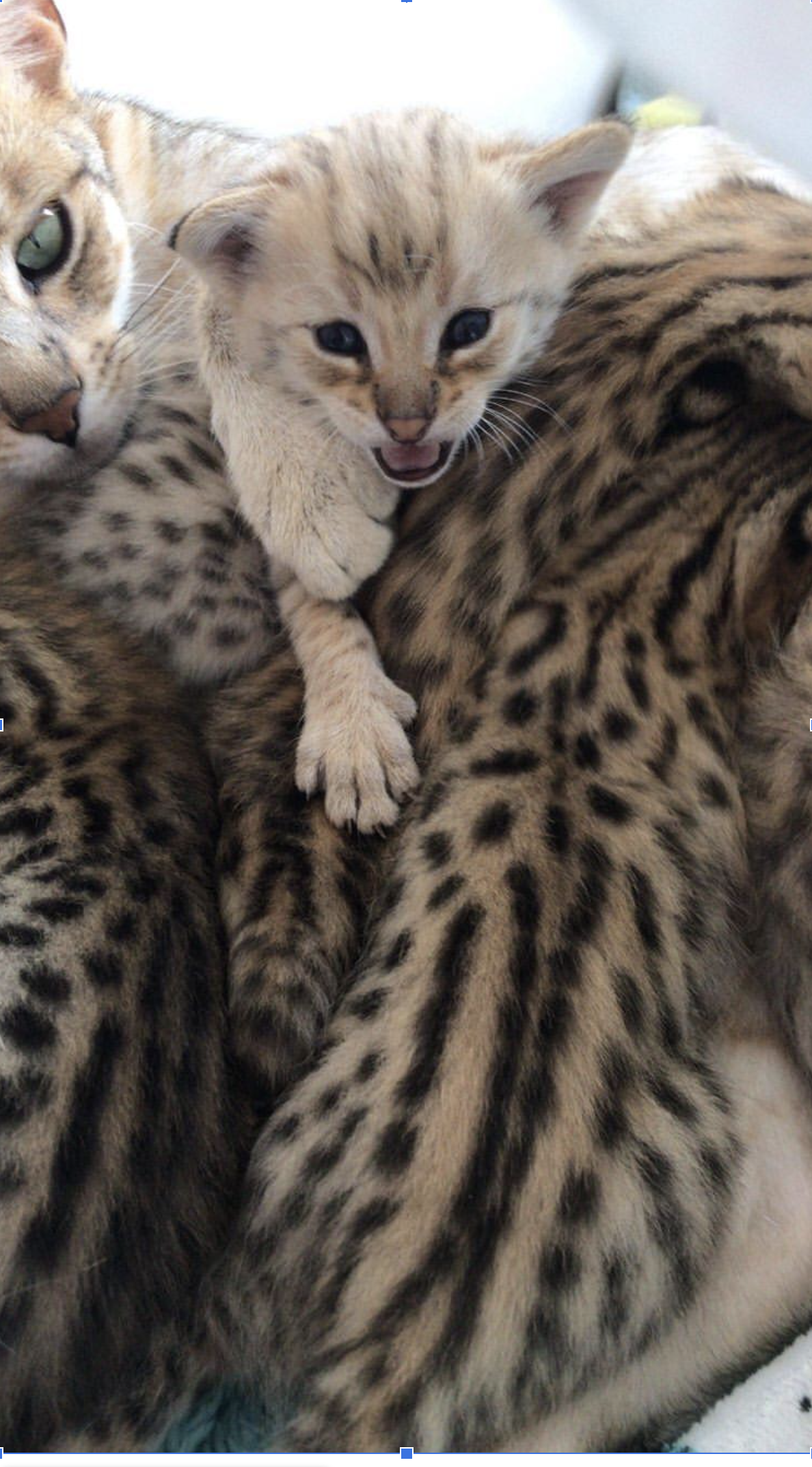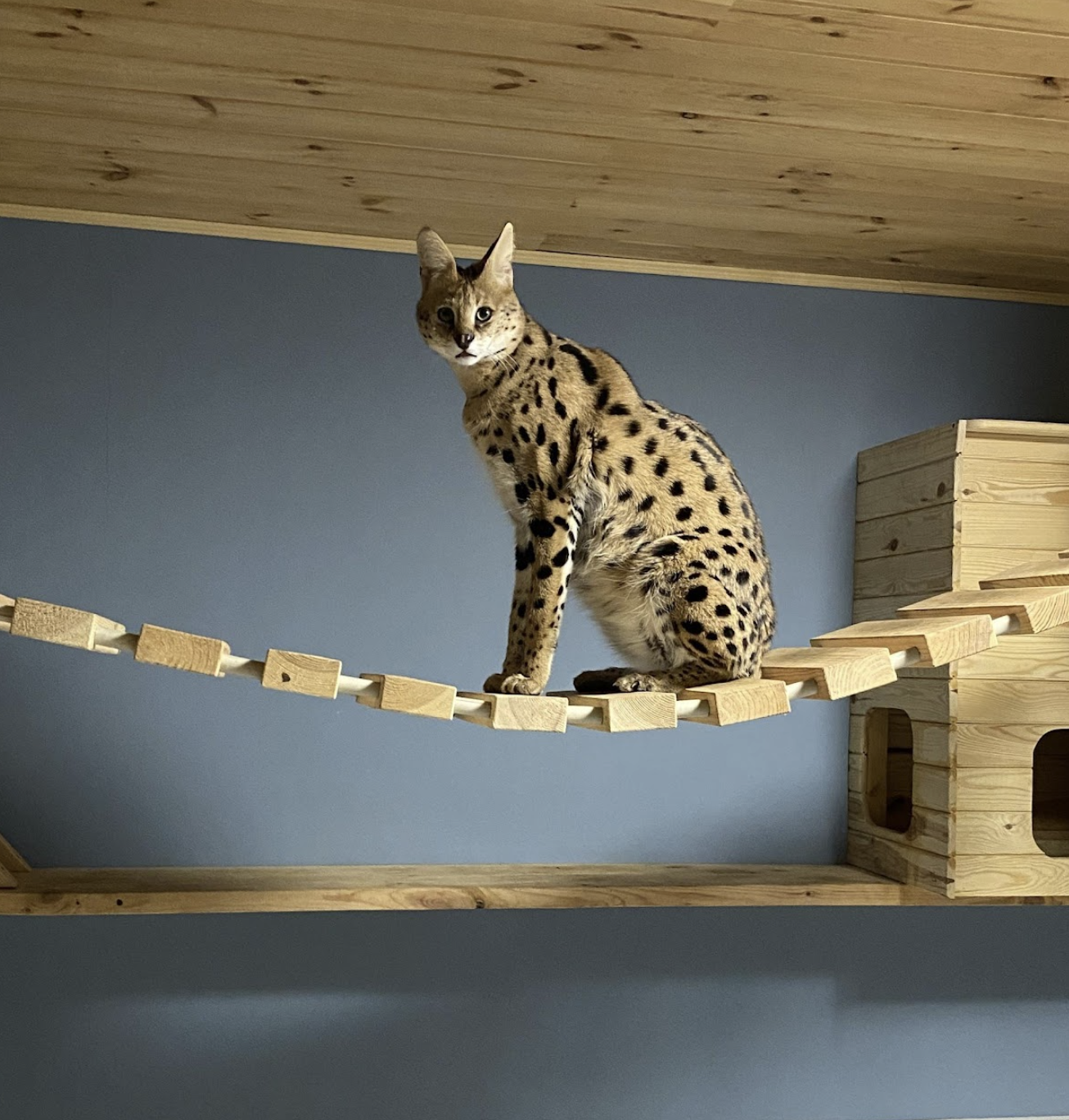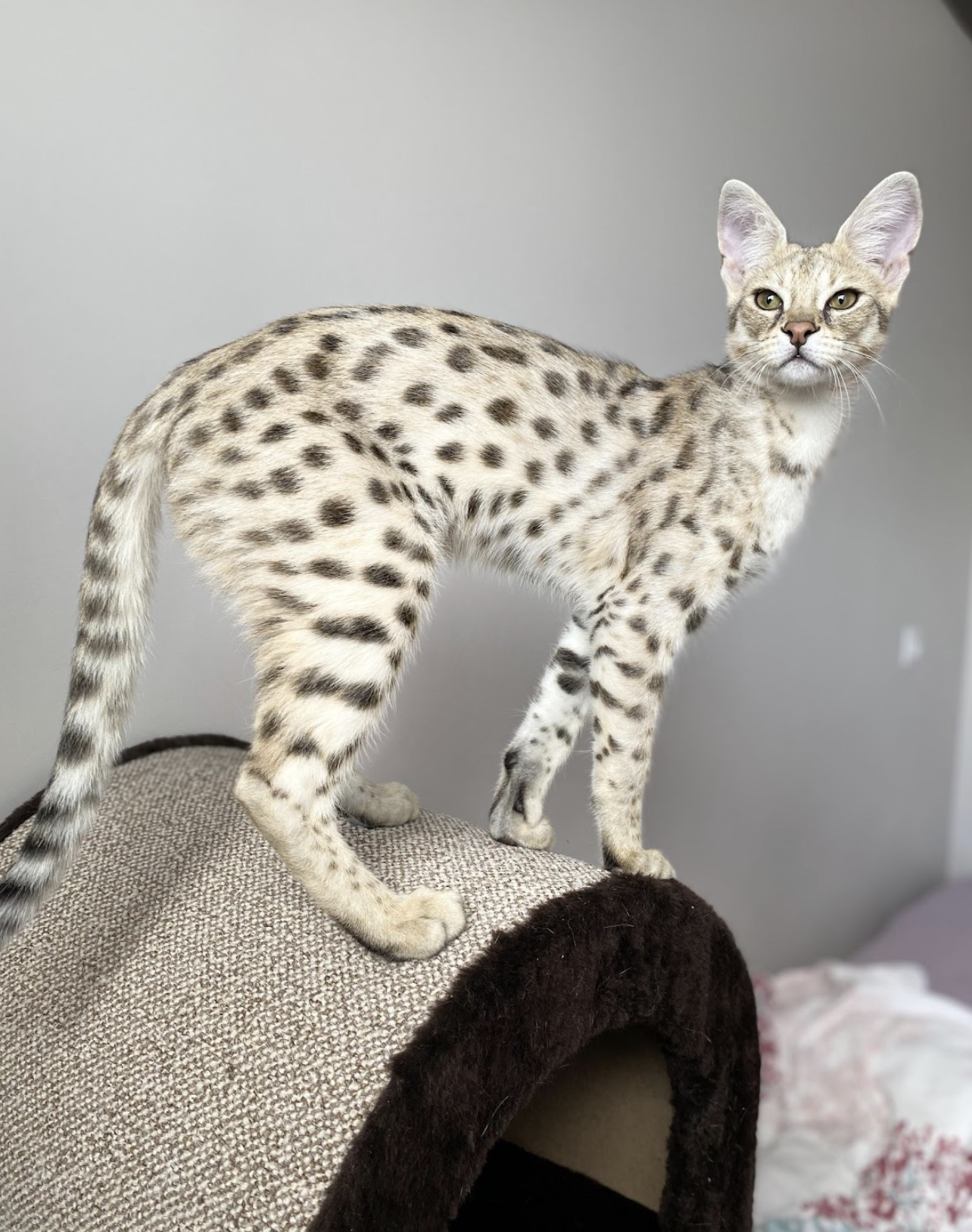An Interview With Savannah Cat Breeder Kronos Savannah
Please tell us about your location, background, family, past or current occupation(s) besides breeding, and hobbies/interests.
Hello, we are Anna and Andrew, and we live in Kyiv, Ukraine; currently, we're in the western part of Ukraine in a small town near the Polish border. We have to relocate because of war and dangerous situations in Kyiv. Before the war, we also had a small family business connected with meat products, but we are presently focused on breeding. Another hobby for us is helping homeless animals and animal shelters. Before the war, we often rescued homeless animals and placed them in new families. Our family has one rescued cat and two dogs from the shelter.
How did you get started with Savannah breeding?
Cats have always been a part of our life; since childhood, every one of us has had cats, and even when Andrew and I started to live together, we bought two cats. They were British shorthair. Our love for the savannah breed started long before we purchased our first savannah kitten. We desperately wanted to have serval or savannah kittens. We bought our first Savannah F1 boy, "Kronos," in 2016, and since that time, are entirely in love with this breed. After Kronos appeared in our life, we decided we wanted to breed kittens like him. We were fond of his beauty and personality. Besides, there was only one Savannah cat breeder in Ukraine then, and the breed was not popular and mostly unknown to people.
How long have you been breeding Savannahs?
We started our program in 2017-2018 when we bought our first serval boy Solomon and two f5 girls for him - Leia and Freya. At the same time, we bought a plot of land in Kyiv to build a house for our cattery. In the summer of 2018, Leia gave birth to her first kitten. Unfortunately, they were born premature, and we were not experienced enough to save them. So we have lost our first F1 litter. It was shocking and depressing. I cried for a couple of weeks; it broke my heart. Our first savannah litter was born on May 12, 2019--six little Savannah F1 kittens.
Is your family involved with your cattery work?
Our family is involved in the cattery life, but my husband and I do the most of the work. Our daughter helps us carry kittens, play with them, and make them the sweetest babies with the best personalities. Also, our parents help us sometimes with kittens and adult cats.
What's your typical daily routine at your cattery from morning to evening?
Our typical day starts in the morning. Firstly we feed our cat mothers and their kittens, and then we give a little food to the adult cats, it can be a couple of one-day chickens or quail. After the morning feeding, we usually do different home jobs, play with cats and kittens, have free time, or go shopping. Our next feeding time comes at 4-5:00 pm, a time for the big feeding. When we feed all our cats and dogs, it takes about 2 hours to feed them all. After this, we have family time, watching movies, playing board games, and spending time together. Before we go to sleep, from 10-11:00 pm, we feed mothers and kittens for the last time and wish them all a good night.
What's the best part about breeding?
I love to be with my cats, and the best part of breeding is our happy moments with them. I love almost everything about breeding. I like nurturing kittens, I love playing with them, I love when they find their best families, and I love being with my cats.
What's the worst/most challenging part about breeding?
Every breeder has faced these problems repeatedly, and I think the hardest part is when cats are sick. Savannah breeding is very hard in breeding, especially for early generations, kittens are often born premature, and it's very hard to help them, doing everything that you can do in this situation. It's very painful to see when kittens die or are born prematurely. It's hard to see the momma cat's eyes. She already loves her kittens so much and is ready to be a mother, but the kittens are dying. This year was tough for me as I had to leave my cats in Kyiv with my husband at the start of the war. I love them so much and worried I'd never see them again. And next, we have to evacuate all the cats to the safe part of the country. It took a lot of time and nerves to do it. Next, we had problems making comfortable rooms for them in the new house, and we had to do it fast. It was madness, but we have overcome all these struggles.
Did you or do you have a breeder mentor(s) you wish to acknowledge?
No, I don't. Everything I know, I've comprehended through my own experience and learned everything myself.
Have you mentored other breeders, and if yes, who?
I have a lot of breeder friends, and it's great that everybody is friendly and responsible in this business. It's easy to communicate with other breeders from all over the world. But I've never mentored other breeders. We often speak with other breeders about different questions, but I've never taught anyone how to breed.
What's the best breeding tip or advice you've received from another breeder?
I try to do everything myself in my breeding program and seldom ask for advice.
What's the biggest strength AND weakness of the Savannah breed?
Savannah cats are a unique breed. I have many cats of different breeds: British shorthair, Orientals, Chausie, Abyssinians, and stray cats. I can say that Savannahs are unique and unforgettable. They are intellectually developed, beautiful, intelligent, and playful; even adult cats behave like kittens. Savannahs are devotees and like to be at the center of attention 24/7. Once you get a Savannah cat, you will wish to have more and more Savannahs until you have a house full of these beautiful creatures.
Although their weakness comes from their high intellect, they want to be with humans all day. Therefore, Savannahs aren't suitable for people who spend a lot of time at work or who love to travel. They are firmly attached to their human and would be bored without that interaction. Another problem is the destructive force of Savannahs. They can damage everything in your house, from floor to ceiling, and have destroyed my house too--doors, floor, windows, ceiling, and furniture. So by buying a Savannah cat, people should be ready that their habitual life will change forever.
What should new breeders know they may not have considered that you've learned from breeding?
I would like to wish new breeders not to lose heart at the first difficulties. Breeding is a challenging and complicated process, and not everything can go with ease.
Do you feed your Savannahs and kittens a raw diet, and do you recommend raw feeding to new owners? Why/Why not?
I have both a raw diet and a diet with prepared food. For the servals, caracals, and F1-F2 Savannahs, it's raw meat diet. The foundation stone of my raw diet is one day chicken, quail, and rabbit. Also, we feed cats with raw chicken, sometimes fish, vegetables, and fresh grass. All meat must be with bones. For the lover generation cats, F5-F6 savannahs, I usually use wet and soft cat food. As for the kittens, we feed them raw meat at the ages of 1.5 - 2 months. We are starting with finely chopped or quail with bones. Next, it's one-day chickens and chopped rabbits.
Do you have a favorite(s) Savannah Cat website or cattery website that stands out you wish to acknowledge?
There are a lot of great breeders around the world, and everyone can learn something new. But I can't highlight one or more websites.
Do you or have you bred any other type of cat or animal besides Savannahs? If yes, please elaborate on that.
Besides Savannah cats, my next favorite cats are Servals and Caracals. I don't breed Servals, but I have three boys with very different personalities.
The other cats we breed are Caracals. I love them also, but they are very complicated cats. Our firstborn kitten was a Caracal baby girl we named "Aurora." "Eva" and "Jamon" are the parents of all our Caracal kittens.
What concerns do you have regarding the future of the Savannah breed?
Today some breeders don't monitor the quality of their sires and kittens. In addition, such backdoor breeders significantly lower prices for kittens, thus depreciating the breed. Another problem is that some breeders do not strive for purebreds and mix Savannahs or Servals with other breeds. Also, breeders often hide with whom they knit their Savannahs or Servals, passing off kittens as purebreds. It's a common problem of post-soviet country breeders.
What is your favorite(s) generation to breed and why? What generations do you produce?
My favorite Savannah cat generation to produce are F1 and F2 Savannahs. They are the most distinguished and beautiful cats. However, it's hard to produce F1 Savannahs. Besides F1 and F2 Savannahs, I also produce F5-F6 savannahs, but not very often. Our cattery focuses on breeding F1 and F2 savannahs.
Do you attend cat shows, and if yes, what's your highest achievement?
No, I don't attend any cat shows. One of the main reasons for not participating in cat shows is that I don't want to stress my cats and kittens. A large number of people and unfamiliar surroundings can cause harm to them. And another reason is that we don't have big shows to present
Savannah cats in Ukraine. Here, we only have three savannah cat breeders. The Ukrainian Savannah breed is still very unknown and undeveloped.
What else would you like the Savannah world to know about you and your cattery?
Our website: www.royalpridecat.com
Help SAVANNAHGANS® Grow and Reach Every Savannah Cat-Owning Household! All support is humbly appreciated (visit the clickable underlined links).
Subscribe (free) HERE
Share this article on your social media platforms.
Leave a Comment. (this is VERY helpful to our growth and Google recognition)
Follow on Instagram.
Follow on Pinterest







